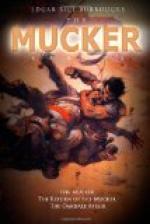Thus he remained for a moment threatening to shoot at the first sound of movement in the room, and then he opened the door again, and stepping just outside ordered the prisoners to file out one at a time.
As each man passed him Flannagan scrutinized his face, and it was not until they had all emerged and he had reentered the room with a light that he discovered that once again his quarry had eluded him. Detective Sergeant Flannagan was peeved.
The sun smote down upon a dusty road. A heat-haze lay upon the arid land that stretched away upon either hand toward gray-brown hills. A little adobe hut, backed by a few squalid outbuildings, stood out, a screaming high-light in its coat of whitewash, against a background that was garish with light.
Two men plodded along the road. Their coats were off, the brims of their tattered hats were pulled down over eyes closed to mere slits against sun and dust.
One of the men, glancing up at the distant hut, broke into verse:
Yet then the sun was shining down, a-blazing
on the little town,
A mile or so ’way down the track a-dancing
in the sun.
But somehow, as I waited there,
there came a shiver in the air,
“The birds are flying south,” he
said. “The winter has begun.”
His companion looked up at him who quoted.
“There ain’t no track,” he said, “an’ that ’dobe shack don’t look much like a town; but otherwise his Knibbs has got our number all right, all right. We are the birds a-flyin’ south, and Flannagan was the shiver in the air. Flannagan is a reg’lar frost. Gee! but I betcha dat guy’s sore.”
“Why is it, Billy,” asked Bridge, after a moment’s silence, “that upon occasion you speak king’s English after the manner of the boulevard, and again after that of the back alley? Sometimes you say ‘that’ and ‘dat’ in the same sentence. Your conversational clashes are numerous. Surely something or someone has cramped your original style.”
“I was born and brought up on ‘dat,’” explained Billy. “She taught me the other line of talk. Sometimes I forget. I had about twenty years of the other and only one of hers, and twenty to one is a long shot—more apt to lose than win.”
“‘She,’ I take it, is Penelope,” mused Bridge, half to himself. “She must have been a fine girl.”
“‘Fine’ isn’t the right word,” Billy corrected him. “If a thing’s fine there may be something finer, and then something else finest. She was better than finest. She—she was—why, Bridge, I’d have to be a walking dictionary to tell you what she was.”
Bridge made no reply, and the two trudged on toward the whitewashed hut in silence for several minutes. Then Bridge broke it:
And you, my sweet Penelope, out there somewhere
you wait for me
With buds of roses in your hair and kisses on
your mouth.
Billy sighed and shook his head.




